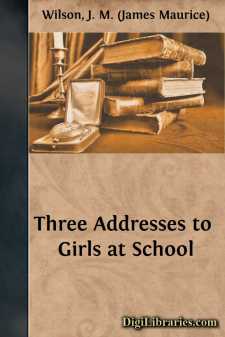Categories
- Antiques & Collectibles 13
- Architecture 36
- Art 48
- Bibles 22
- Biography & Autobiography 813
- Body, Mind & Spirit 142
- Business & Economics 28
- Children's Books 15
- Children's Fiction 12
- Computers 4
- Cooking 94
- Crafts & Hobbies 4
- Drama 346
- Education 46
- Family & Relationships 57
- Fiction 11828
- Games 19
- Gardening 17
- Health & Fitness 34
- History 1377
- House & Home 1
- Humor 147
- Juvenile Fiction 1873
- Juvenile Nonfiction 202
- Language Arts & Disciplines 88
- Law 16
- Literary Collections 686
- Literary Criticism 179
- Mathematics 13
- Medical 41
- Music 40
- Nature 179
- Non-Classifiable 1768
- Performing Arts 7
- Periodicals 1453
- Philosophy 64
- Photography 2
- Poetry 896
- Political Science 203
- Psychology 42
- Reference 154
- Religion 513
- Science 126
- Self-Help 84
- Social Science 81
- Sports & Recreation 34
- Study Aids 3
- Technology & Engineering 59
- Transportation 23
- Travel 463
- True Crime 29
Three Addresses to Girls at School
Categories:
Description:
Excerpt
EDUCATION.
Now that I have given away the certificates it will be expected that I should make a few remarks on that inexhaustible subject, Education. My remarks will be brief.
I take this opportunity of explaining to our visitors the nature of the Higher Certificate examination. It is an examination instituted originally to test the efficiency of the highest forms of our public schools, and to enable boys to pass the earlier University examinations while still at school. The subjects of study are divided into four groups. In order to obtain a certificate it is necessary to pass in four subjects taken from not less than three groups. A certificate therefore ensures a sound and fairly wide education. The subjects of the groups are languages, mathematics, English history, and lastly science. One concession is made to girls which is not made to boys. They are allowed to pass in two subjects one year, and two others the next, and thus obtain their certificates piecemeal. Boys have to pass in all four subjects the same year. The High School sent in seventeen candidates for the examination in two or three of the subjects—History, Elementary Mathematics, French, German, and Latin,—and fifteen of these passed in two subjects at least: and, inasmuch as seven of them had in a previous year passed in two other subjects, they obtained their certificates. The rest carry on their two subjects, and will, we hope, obtain their certificates next summer; six of them appear to be still in the school. This is a very satisfactory result. The value of these certificates to the public is the testimony they give to the very high efficiency of the teaching. These examinations are not of the standard of the Junior or Senior Local Examinations. They are very much harder. And all who know about these matters see at a glance that a school that ventures to send in its girls for this examination only is aiming very high. The certificates for Music, given by the Harrow Music School examiners, are also recognised by the profession as having a considerable value. But on this subject I cannot speak with the same knowledge.
The value of these examinations to the mistresses is that they serve as a guide and standard for teaching. We are all of us the better for being thus kept up to the mark. Their value to you is that they help to make your work definite and sound: and that, if it is slipshod, you shall at any rate know that it is slipshod.
Therefore, speaking for the Council, and as the parent of a High School girl, and as one of the public, I may say that we set a very high value on these examinations and their results. They test and prove absolute merit. Now, you may have noticed that one of the characteristics of this school is the absence of all prizes and personal competitions within the school itself; all that only brings out the relative merit of individuals. I dare say you have wondered why this should be so, and perhaps grumbled a little. "Other girls," you say, "bring home prizes: our brothers bring home prizes; or at any rate have the chance of doing so—why don't we?" And not only you, but some friends of the school who would like to give prizes—for it is a great pleasure to give prizes—have sometimes wondered why Miss Woods says "No." I will tell you why....


